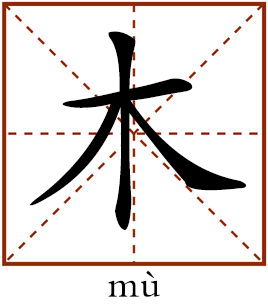Wood

Mu (trees or wood) in Chinese language refers to all kinds of trees. Sharing the same component “木,” scores of Chinese characters mean either various kinds of trees, such as 松 (pine trees), 桦 (birches) and 枫 (maple trees), or wooded items such as 杖 (walking sticks) and 栏 (railings).
木犹如此,人何以堪
mù yóu rúcĭ, rén héyĭ kān
Mu means “trees” while ren means “a human being.” You means “even” while ruci means “like this.” Heyi means “how.” Kan means “to bear or to endure.” This idiom, taken literally, means even a tree still ages like this, so how can a human being endure it?
This idiom originates from the story of Huan Wen (312-373), a military general in the Eastern Jin Dynasty. According to the A New Account of Tales of the World by Liu Yiqing (403-444), when leading an army marching towards the north, Huan Wen passed by Jincheng in Langya County, where he used to serve as a local government official. He saw the willow tree he planted years ago when he was working there. That tree had grown huge, with a perimeter of 10 wei, a unit of measurement equals the length of two hand-spans that with thumb and index-finger stretched. Huan sighed emotionally, saying: “Even a tree (ages) like this, how can a human bear it?” Tears trickled down his cheeks when grasping the willow branches, according to the book.
This idiom or the saying “general’s tree” is used when one sighs at the feeling that how time flies or that one is aging.
十年树木,百年树人
shínián shù mù, băinián shù rén
Shinian means “10 years” while bainian means “100 years.” Shu mean “to edify.” Ren refers to people. This idiom, taken literally, means that it takes ten years to grow trees, but a hundred years to edify people.
Guan Zhong (c.723-645) wrote in his masterpiece Guanzi that “In making a one-year plan, the best thing is to grow crops; in making a 10-year plan, the best thing is to plant trees; in making a 100-year plan, the best thing is to edify people.”
This proverb is used to emphasize the importance as well as the hard work of educating and edifying people.
(edited by CHEN ALONG)
